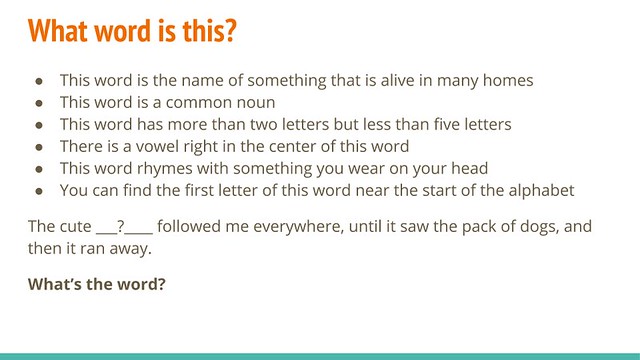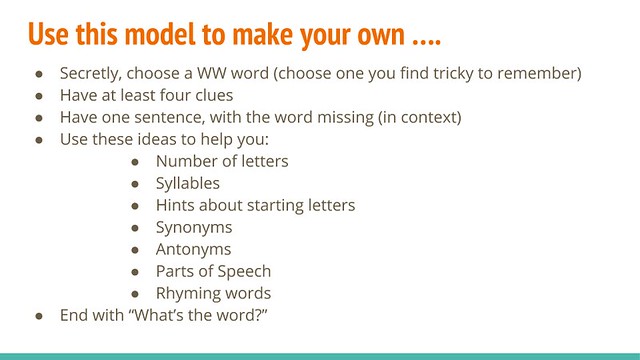 (This is for the Slice of Life challenge, hosted by Two Writing Teachers. We write on Tuesdays about the small moments in the larger perspective … or is that the larger perspective in the smaller moments? You write, too.)
(This is for the Slice of Life challenge, hosted by Two Writing Teachers. We write on Tuesdays about the small moments in the larger perspective … or is that the larger perspective in the smaller moments? You write, too.)
I introduced a game-style activity yesterday for our vocabulary lessons called Mystery Word, where you give a series of escalating clues for the guesser to guess the word. Honestly, I needed about twice the time I allocated for this during classtime (we had other things to get to, too), and it all felt too rushed to be as effective as I wanted it to be.
Next time … more time.
This is my very simple sample (which I followed with a sample of a word from our class vocabulary list):
But, the students really enjoyed the challenge of coming up with clues that pointed to a vocabulary word without giving it away completely at the start. I had them write the clues out on notecards, which we then distributed around the room. A better version would have been to have each one read the clues, one clue at time, to a partner, and use our listening skills to locate the words. And I probably should have done more quick mini-lessons on syllables, Parts of Speech, rhyming, etc.
I didn’t make up the Mystery Words activity, and I was trying to remember where it came from. I think it is both a variation of a Mystery Number activities that our math teacher does earlier in the year (complex clues to find a number) and an adaptation of a lesson from a writing project teacher who co-taught a digital writing summer project for struggling high school students with me as my English as a Second Language partner, and I gleaned a lot of vocabulary acquisition ideas from her work.
The game-and-guess format makes for an engaging time, and adds a wrinkle to learning and using new words.
Peace (is the lesson),
Kevin


Kids seem to really enjoy learning through playing games. Something we adults have forgotten how to do. I like that you tried a new approach, saw the drawbacks and thought about modifications. That’s teaching in action!
Gaming as notecards, eh? It always takes me at least three tries before I get an activity or lesson tweaked to my liking. Seems like this was an awesome beginning to an even richer lesson ahead.